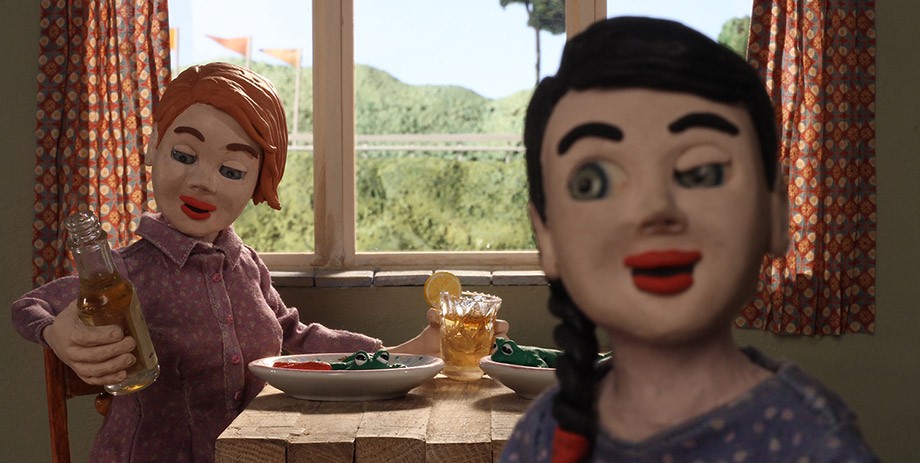Kasia Nalewajka attended the National Film and Television School in London. She wrote and directed the animated short film Sacculina Carcini (2014), and co-wrote and directed the animated shorts Sponge Ideas (2011) and Pineapple Calamari (2014).
In the quirky, colorful stop-motion Pineapple Calamari, the eponymous character dreams of being a horse-racing champion. But when tragedy befalls the two inseparable women who share his love of riding, he finds his race to the roses abruptly halted. (TIFF official site)
The 9-minute short Pineapple Calamari will play at the Toronto International Film Festival on September 10 and 13.
WaH: Please give us your
description of the film playing.
KN: Pineapple Calamari is a short, animated film
made with a puppet stop-motion technique. The main character, Pineapple Calamari, is a young, beautiful horse who dreams of becoming a horse-racing champion. He’s being trained and taken care of by
two sisters who share a very special connection. When a tragedy befalls this
happy family, their social dynamic takes a turn into the unexpected.
The story explores the
complex human emotions of friendship, dealing with loss and sacrifice. Although
the themes of the film are quite serious, the tone of it is comedic and a bit
surreal. It starts of a classical story, but as we get drawn into it, more
and more unusual things start happening.
WaH: What drew you to
this story?
KN: I’ve always been
interested in stories where the individuals find themselves in unexpected and
confusing situations, that make them feel a bit lost and helpless. The
characters in Pineapple Calamari are faced
with feelings so overwhelming that they are incapable of dealing with it the
traditional way. Their behavior becomes a bit mad, but this is what makes the
story both touching and entertaining.
WaH: What was the biggest challenge
in making the film?
KN: Coming up with the details
of the story and finding the proper structure was the biggest challenge. The
skeleton of the story was solid, but it was lacking the satisfying surface. Me
and two other co-writers (Daniel Negret, the producer, and Manuela Lupini, the
editor) spent a lot of time coming up with ideas and testing them out before
we managed to find the right solutions. The whole team was helping.
WaH: What do you want people to
think about when they are leaving the theatre?
KN: I want the audience to
feel for the characters, to understand them and their actions. I want them to
feel entertained and satisfied. I want them to feel as if they were taken on a
fantastic journey, one that starts in an ordinary place and gradually takes you
into more and more bizarre landscapes.
WaH: What advice do you have for
other female directors?
KN: Although nowadays there are more women in the film industry than there used to be, I still feel like female directors are sometimes not perceived as the head of the
project by some of the team members. So I would suggest that they stand up
for their vision, and don’t let anybody convince them that they don’t have
enough skills or knowledge to take the wheel.
WaH: What’s the biggest
misconception about you and your work?
KN: People think I’m mad. I’m
not mad. These stories make sense, and some of them are actually true.
WaH: How did you get your film
funded?
KN: Pineapple
Calamari is a graduation
film from the National Film and Television School. It was made with the school
budget and the joint efforts of very dedicated students from all the departments.
Aside from that, some very talented people from outside the school volunteered
to help on the production.
WaH: Name your favorite women
directed film and why.
KN: I really like 33 Scenes from Life (2008) by the Polish director
Malgorzata Szumowska. This is a deeply personal and very evocative piece,
following the life of one family for many years. It explores all the shades of
human emotions and behavior, and it does it with a real mastery, leaving no
space for simplification.







